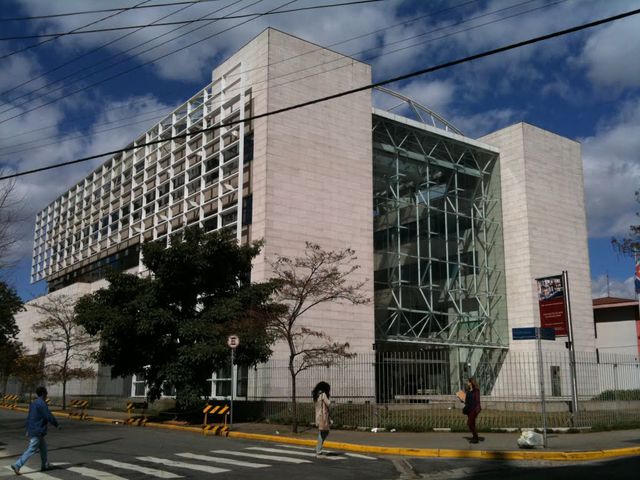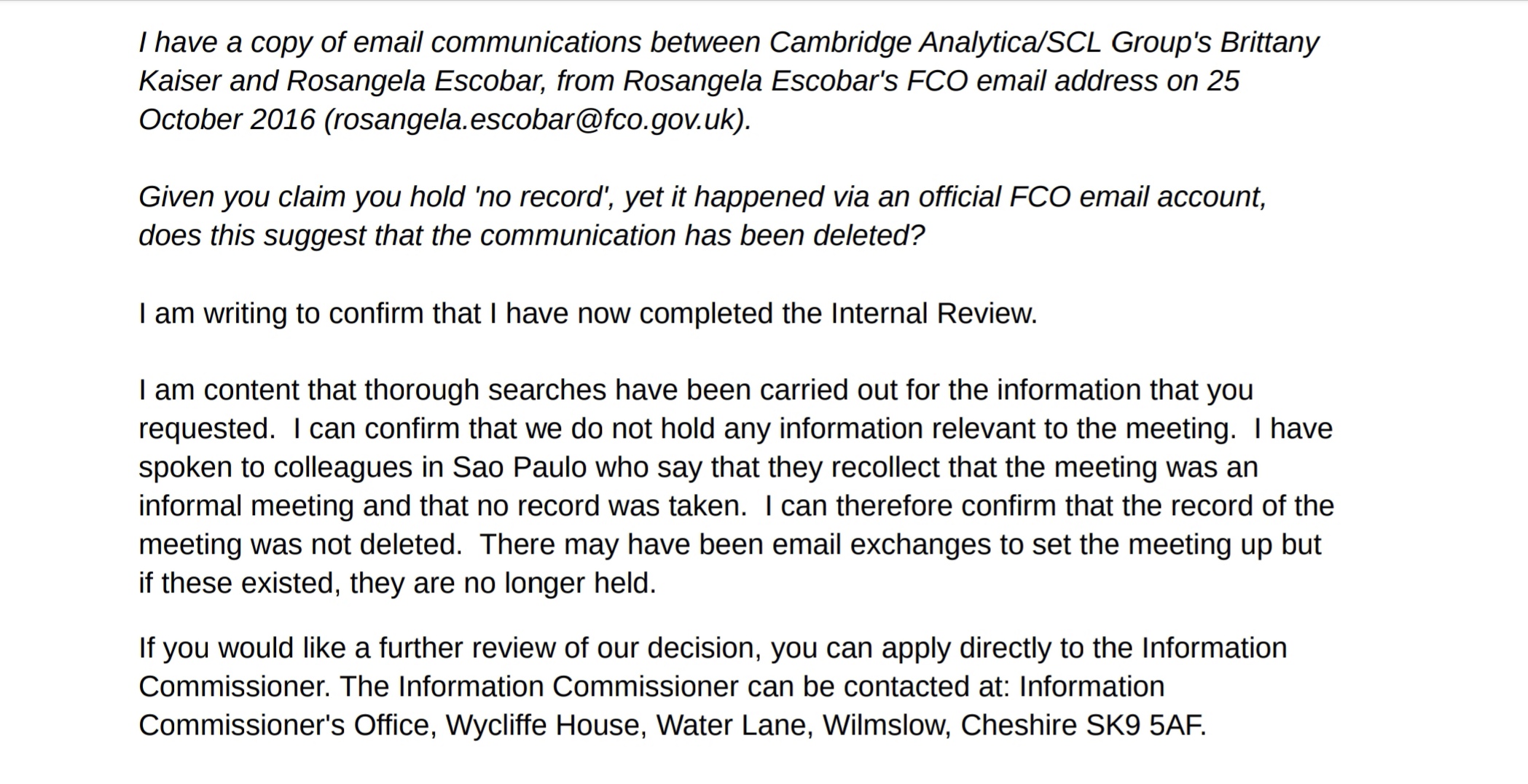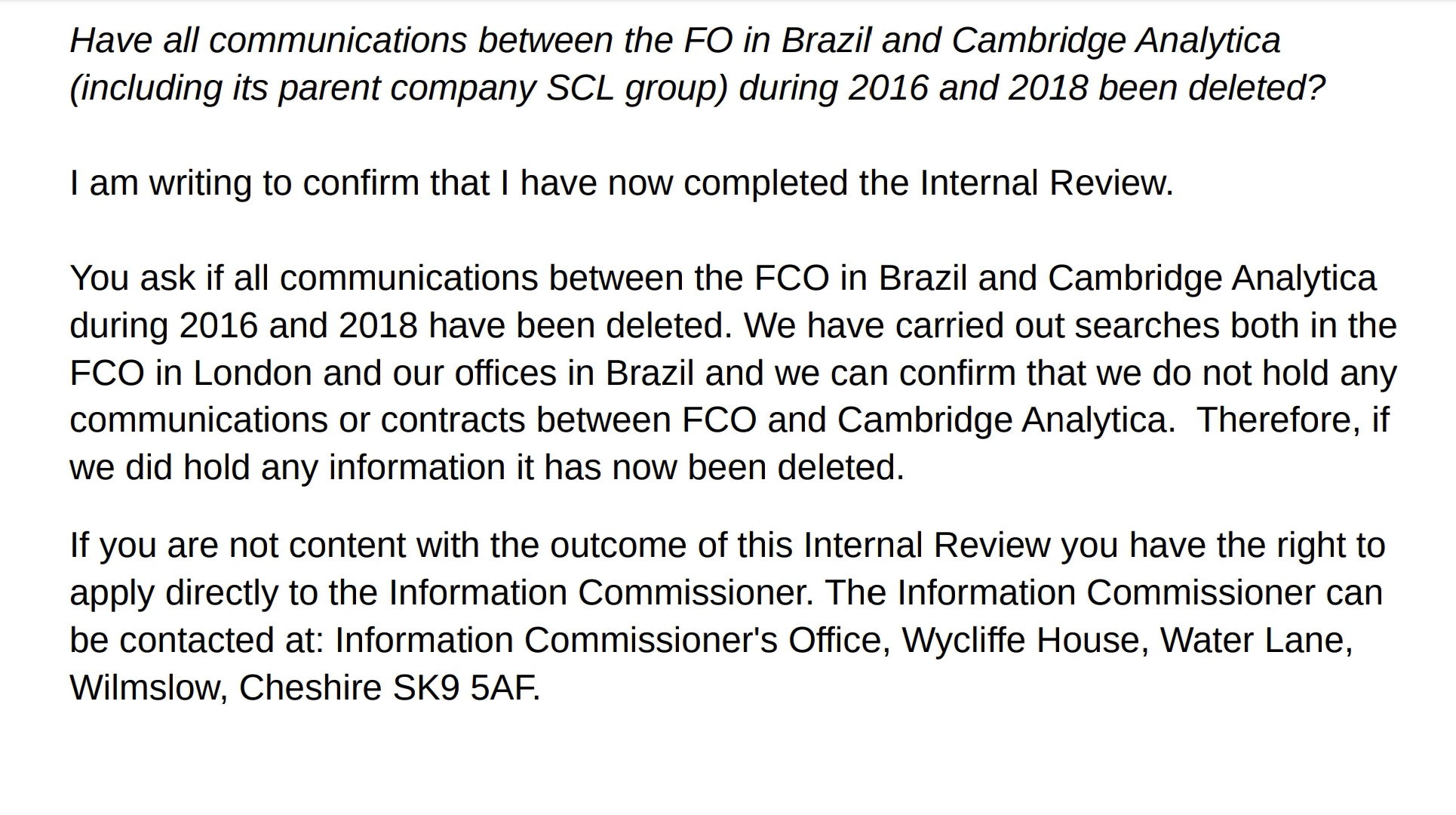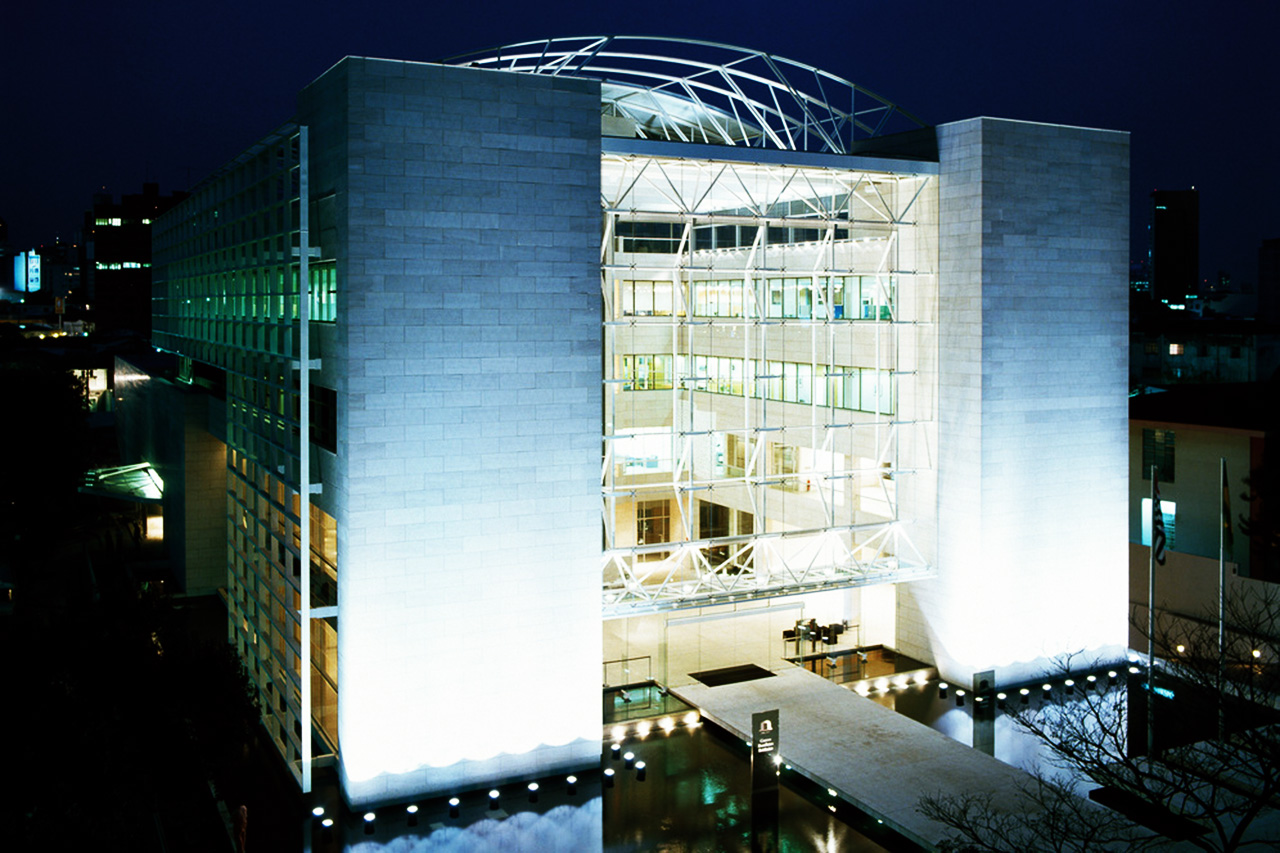The UK Foreign and Commonwealth Office (FCO) has deleted records of its discussions with strategic communications companies SCL and Cambridge Analytica in Brazil, two Freedom of Information requests reveal. This is part one of a series on British involvement in Brazilian internal affairs. Parts two and three to follow shortly.
By John McEvoy, Nathalia Urban
Two years on from the original Cambridge Analytica scandal, serious and unanswered questions remain about the UK government’s role in foreign elections – not least in Brazil.
On 1 January 2020, the Twitter account @HindsightFiles released a new tranche of over 100,000 documents relating to Cambridge Analytica’s work in over 60 different countries. The documents were released by former Cambridge Analytica employee and now whistle-blower Brittany Kaiser.
One of the key documents is an email exchange between Kaiser and FCO officials at the British consulate in Sao Paulo, Brazil. Various employees of SCL Group, Cambridge Analytica’s parent company, are CCd into the email.
Kaiser emailed the British consul on 25 October 2016: “I am writing to introduce my Managing Director Mark Turnbull (copied) of the SCL Group, a London-based strategic communications firm working on elections, defense projects, and commercial marketing globally [emphasis added]”.
Behavioural objectives
Mark Turnbull has a career history of overseeing psychological operations projects on behalf of the UK and US governments, including propaganda campaigns in the Middle East and a spell at the disgraced PR firm Bell Pottinger, which was eventually exposed for deliberately stoking ethnic tensions in South Africa.
“I sincerely apologize for the short notice”, the email continued, “but Mr Turnbull will be in arriving in [sic] Sao Paulo early tomorrow morning and I would like to see if it is possible for him to meet with Consul General Crellin during his business trip… Please advise if you have an appointment available, and we look forward to coordinating with HMG during our local business development efforts”.
British Deputy Consul-General Rosangela Escobar responded to Kaiser some hours later on 25 October 2016 to “confirm the meeting with our Consul General Joana Crellin and Lauren Frater, Head of Team, Sao Paulo”. The meeting was arranged for 26 October at the Centro Brasileiro Britânico.

Centro Brasileiro Britânico, São Paulo.
Inaugurated in the year 2000, the Centro Brasileiro Britânico is located in the Pinheiros neighbourhood of São Paulo, and houses the FCO’s Consulate, the British Council, BBC Brasil and, according to information provided to the authors, UK Intelligence agencies.
Though communications between Cambridge Analytica and the UK Foreign Office in Brazil are unarguably within the public interest, two Freedom of Information requests have revealed that the FCO holds “no record” of the meetings.
“I have spoken to colleagues in Sao Paulo who say that they recollect that the meeting was an informal meeting and that no record was taken”, the FCO said. “There may have been email exchanges to set the meeting up but if these existed, they are no longer held”.

In response to another FOI request concerning all communication between the FCO in Brazil and Cambridge Analytica during 2016 and 2018, the FCO claimed:
“We have carried out searches both in the FCO in London and our offices in Brazil and we can confirm that we do not hold any communications or contracts between FCO and Cambridge Analytica. Therefore, if we did hold any information it has now been deleted”.

The political landscape
In the months prior to Turnbull’s visit, Brazil had been rapidly rising in Cambridge Analytica’s list of priorities. In June 2016, Turnbull named Brazil – alongside Macedonia, Romania, Ghana and Mexico – as one of the company’s “five target countries where some data due diligence would be really helpful”. Another Cambridge Analytica research document found Brazil to be one of the best countries for “audience analytics” and “advertising” in Latin America and, within a pitching document in Portuguese, the company boasts that “our methodology was approved by the Department of State in the USA [and the] Ministry of Defence in the United Kingdom”.
The leaked emails also suggest that, during August 2016, Kaiser visited Brazil on behalf of the company to garner preliminary political contacts. “You’re heading down there in August for 10 days or so to assist with political connections”, Turnbull told Kaiser in June 2016: “Keep me posted”. By 20 October, Turnbull instructed Kaiser: “Looks like I’m off to Sao Paulo… Time to work those contacts!”, suggesting Kaiser’s prior trip bore fruit and the existence of potential earlier (undocumented) correspondence between the company and the FCO.
Just five days prior to his visit in October 2016, Turnbull laid out the company’s objectives in Brazil in a private correspondence with André Torretta of Ponte Strategy, a Brazilian data company with whom Cambridge Analytica later collaborated. Turnbull explained that “more broadly, I would aim to come away with a much better understanding of… the political landscape – with a focus on how we position and pitch for the 2018 elections (presidential, national congress, state governors and state legislatures) [emphasis added]”.
A separate email sent by Turnbull on 19 October reaffirms this objective: “‘the principal purpose of the visit is… to discuss with [Ponte Strategy] how we jointly pitch to political parties in the run-up to the 2018 elections, as well as resourcing a broader business development plan”.
The documents also show that Cambridge Analytica arrived in Brazil after hiring Pedro Vizeu-Pinheiro, a Spanish national educated at London South Bank University. Emails from May 2016 demonstrate that Vizeu-Pinheiro, whose LinkedIn page claims he was the director of Cambridge Analytica in Brazil between March 2016 and July 2017, had conversations with a possible presidential candidate even before officially working with the company. The participants spoke about potentially conducting election polls for him.
“In the next 18 months”, Vizeu-Pinheiro further anticipated in September 2016, “we will have 28 political campaigns and at least 84 candidates with budget around R$2mn” in Brazil, “without even mention [sic] carrying out contracts for the federal government and their 27 states”.
By January 2017, the documents also reveal that Cambridge Analytica was working on four separate mayoral campaigns in Brazil, “waiting for the next steps”. And at the end of that year, Brazilian Report reported that Torretta – with whom Cambridge Analytica was working – had “admitted to meeting with Sao Paulo mayor Joao Doria – although he will not reveal who the company is working with”.
“What has been deleted and why?”
Since 2016, Cambridge Analytica has been mired in a number of global scandals involving political electioneering, interference and the far-right. In the same period, the Brazilian government has seen one president toppled in a coup, another former president jailed in a politically-motivated legal proceeding, and the resulting rise of the far-right under Jair Bolsonaro.
Journalist Carole Cadwalladr, who broke the original Cambridge Analytica story, commented on the lack of transparency concerning FCO communications with SCL group and Cambridge Analytica in Brazil:
“We know that there was significant contact between the Foreign Office and Cambridge Analytica so this response is surprising and concerning. We know for example that the foreign secretary, Boris Johnson, met Alexander Nix the CEO of Cambridge Analytica at the end of 2016 but we still don’t know what the meeting was about. Deirdre Brock, an MP, has repeatedly tried asking him in parliament but has never received a response. And there’s a whole range of other contact including talks delivered by CA data scientists at a conference organised by the Foreign Office. The fact that the FCO claims no correspondence exists at all is really alarming – what has been deleted and why?”
Why, indeed.
In December 2016 then UK Foreign Minister Boris Johnson held an undisclosed meeting with Alexander Nix of SCL Group/Cambridge Analytica, who was later invited to a conference at which UK government conference concerning the companies’ involvement in the 2016 US presidential election.
In emails released under the freedom of information act, SCL respond to the Foreign Office invitation: “Thank you very much for inviting SCL Group to discuss with the FCO and its partners the data strategy for foreign policy. On behalf of SCL Group I am writing to confirm attendance of our managing director Mark Turnbull and our data scientist David Wilkinson”.
The following themes would be discussed between SCL and the UK Foreign Office:
- Networks – Both diplomatic and social. Understanding, developing, disrupting them. How are networks evolving beyond traditionally geographically centred relationships to align with interests and ideology.
- Knowledge – Combing open source, proprietary and privileged information to deliver powerful insights and deep understanding. Big data – finding the signal in the noise.
- Influence – How people get information and form opinions is changing. New phenomena are emerging – post-truth, echo-chambers and filter bubbles. What are effective influence strategies that embrace these changes?
- Forecasting – How can data and data-driven decision-making help us anticipate issues and opportunities early and where possible take effective action to mitigate/exploit these?”.
While behavioural and societal effects of political campaigns are difficult to measure, we can more easily evaluate how events in Brazil since 2016 have benefitted UK interests: the UK Government’s strategic and commercial interests have largely improved since the impeachment of Dilma Rousseff and the controversial election of Jair Bolsonaro two years later.
In the interest of governmental accountability and transparency, the following questions merit clear answers:
- Why did the FCO meet with SCL/Cambridge Analytica employees in Brazil in October 2016?
- Why did the FCO deem meetings with a self-described “strategic communications firm working on elections, defense projects, and commercial marketing globally” not to be in the public interest?
- Did the FCO in Brazil meet with Brittany Kaiser of SCL/Cambridge Analytica in August 2016, and were there any other meetings?
- Did SCL/Cambridge Analytica, in collaboration with the British FCO, attempt to influence the mayoral/gubernatorial campaigns of, for instance, Rio Mayor Marcelo Crivella, Rio Governor Wilson Witzel, São Paulo Mayor turned Governor João Doria, or the Governor of Minas Gerais Romeu Zima?
- Did SCL, Cambridge Analytica, SCL elections, their personnel, successor organisations such as Emerdata Ltd, SCL Insight Limited, their technologies, strategies and expertise, in partnership with the UK FCO, play any role in the election of Jair Bolsonaro as President, the PSL or any other political party?
[qpp]

